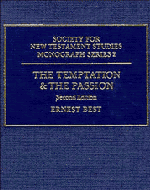Book contents
I - The Temptation Narrative
from PART I - THE TEMPTATION
Published online by Cambridge University Press: 28 October 2009
Summary
We are concerned here neither with the origin of Mark i. 12 f. nor with an estimate of its historical reliability; rather it is our purpose to discuss its place in the Gospel and seek its meaning for Mark. In so doing we make the normal assumption that the Markan narrative at this point contains no knowledge of the tradition common to Matthew and Luke (Q). That is not merely to say that Mark did not know Matthew or Luke, nor that he did know Q, but also that he did not know the tradition of the content of the temptations of Jesus. If this assumption is incorrect and Mark did have some knowledge of the Q tradition, even in a rudimentary form, it will be seen that our conclusions would be reinforced; for we would then be able to argue that Mark has deliberately omitted certain elements in the Q tradition and chosen to emphasise a few details, which thereby receive a new importance: for example, Mark is not interested in the nature of the temptations, only in the fact that a struggle took place. The assumption that Mark did not know Q means that we must banish from our minds our knowledge of Q in discussing Mark. Whereas when we come to read Matthew and Luke it is of great importance to know Mark so that we may see exactly how they have modified his narrative, our very knowledge of Matthew and Luke can form a hindrance to our understanding of Mark because we tend to see him through the eyes of Matthew and Luke.
- Type
- Chapter
- Information
- The Temptation and the PassionThe Markan Soteriology, pp. 3 - 27Publisher: Cambridge University PressPrint publication year: 1990



